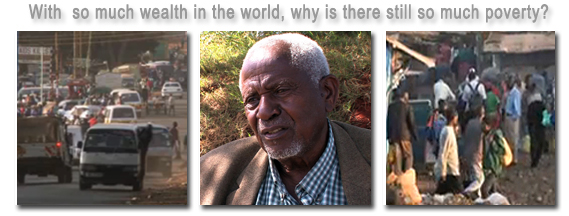
Q & A WITH PHILIPPE DIAZ (continued)
ID: Your interviewees had some harsh critiques of the IMF and The World Bank stating that they served the interests of the rich northern countries and not those of the developing world. Did you contact any current IMF or World Bank officials for their input on this matter?
DIAZ: We did contact many experts "on the other side" the one who defend traditional economic policies either in the US or in the countries where we shot the film. The answers were so appalling that we decided to not include any in the films. These people became masters at not answering the true questions. We got the typical "let's bring mosquito nets and fertilizers and that will end poverty" or like in Bolivia we got the opponent of Evo Morales who was in power before, explaining to us that when he was in power the market was done and it's why he couldn't do anything about poverty and if he was coming back in power he would not do anything either because now the market is up and therefore the market would find the solutions!
ID: In recent months central banks of supposedly economically strong nations have bailed out their financial institutions, and the IMF has given loans to Ukraine, Hungary and Iceland. Why is it that the world seems fine with giving billions of dollars to the financial industries to prevent them from collapsing, when the economies of so many nations have been in distress for centuries?
DIAZ: First of all we have to realize as Martin Sheen – who does the voice over -- says at the end of the film, that our system always was and still is financed by the poor. These gigantic bailouts are another ultimate proof of such. While shareholders of these large companies have pocketed huge sums of money in the past – selling products to the poor – now that the fraud perpetrated by these companies is revealed, it's not the shareholders who will save their own industries, it's the poor again. It's even more absurd is scandalous in the case of privately owned car manufacturers. Now, as Serge Latouche explains in the film, if we are consuming every year 30% more than what the planet can regenerate it simply means that we are digging a hole more and more deep every year and that capitalism to survive has to find new tricks and these bailouts or rescue packages are part of these new tricks.
ID: One of the most devastating and powerful moments in the film was the heartbreaking story of the subsistence farmers and villagers in Kenya being forced and flooded off their land by Dominion, an American company that came to Kenya with support of the corrupt Kenyan government. Dominion built a dam and flooded a nearby village, subsequently destroying their livelihood and homes. Was there any attempt to contact Dominion and confront them with this callous disregard of the well being of the Kenyan people?
DIAZ: There were many attempts to contact Dominion by the local people to negotiate with them. Every time they were welcomed with gun shots or were beaten by Dominion security. This company is the best example of unrestrained capitalism which will not consider and limits or even rules to acquire more profits. They have been involved in many fraudulent activities including in the US.

